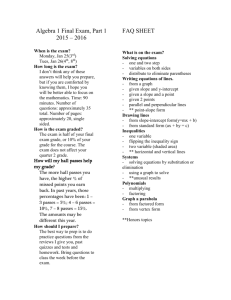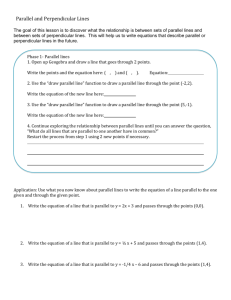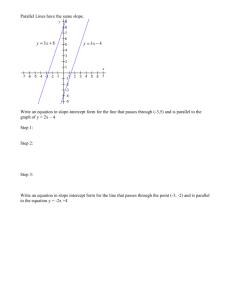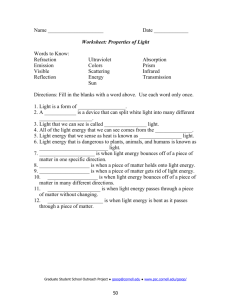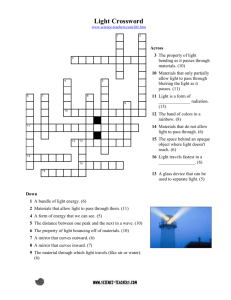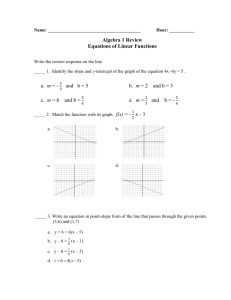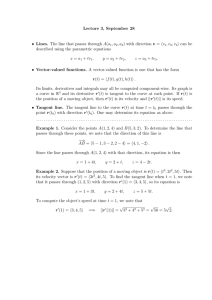Section 5: The Federal Recreation Lands Passes
advertisement
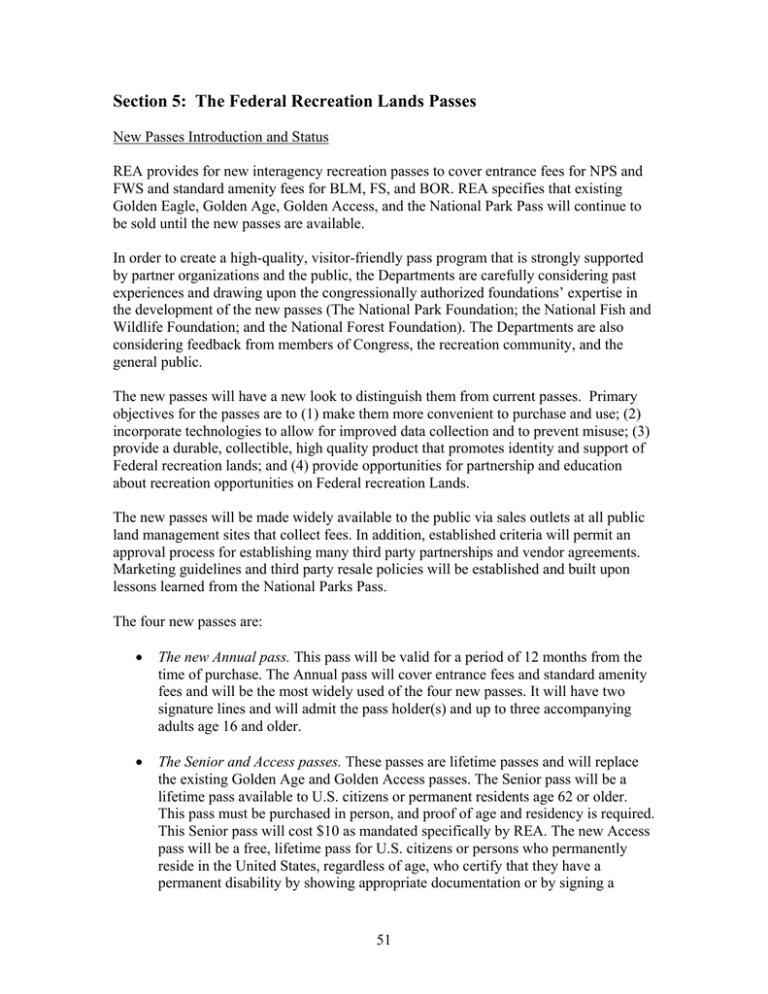
Section 5: The Federal Recreation Lands Passes New Passes Introduction and Status REA provides for new interagency recreation passes to cover entrance fees for NPS and FWS and standard amenity fees for BLM, FS, and BOR. REA specifies that existing Golden Eagle, Golden Age, Golden Access, and the National Park Pass will continue to be sold until the new passes are available. In order to create a high-quality, visitor-friendly pass program that is strongly supported by partner organizations and the public, the Departments are carefully considering past experiences and drawing upon the congressionally authorized foundations’ expertise in the development of the new passes (The National Park Foundation; the National Fish and Wildlife Foundation; and the National Forest Foundation). The Departments are also considering feedback from members of Congress, the recreation community, and the general public. The new passes will have a new look to distinguish them from current passes. Primary objectives for the passes are to (1) make them more convenient to purchase and use; (2) incorporate technologies to allow for improved data collection and to prevent misuse; (3) provide a durable, collectible, high quality product that promotes identity and support of Federal recreation lands; and (4) provide opportunities for partnership and education about recreation opportunities on Federal recreation Lands. The new passes will be made widely available to the public via sales outlets at all public land management sites that collect fees. In addition, established criteria will permit an approval process for establishing many third party partnerships and vendor agreements. Marketing guidelines and third party resale policies will be established and built upon lessons learned from the National Parks Pass. The four new passes are: • The new Annual pass. This pass will be valid for a period of 12 months from the time of purchase. The Annual pass will cover entrance fees and standard amenity fees and will be the most widely used of the four new passes. It will have two signature lines and will admit the pass holder(s) and up to three accompanying adults age 16 and older. • The Senior and Access passes. These passes are lifetime passes and will replace the existing Golden Age and Golden Access passes. The Senior pass will be a lifetime pass available to U.S. citizens or permanent residents age 62 or older. This pass must be purchased in person, and proof of age and residency is required. This Senior pass will cost $10 as mandated specifically by REA. The new Access pass will be a free, lifetime pass for U.S. citizens or persons who permanently reside in the United States, regardless of age, who certify that they have a permanent disability by showing appropriate documentation or by signing a 51 statement of disability. While not specified in REA, an administrative decision was made for the new Senior and Access passes to also cover discounts on some expanded amenity recreation fees such as camping fees, guided tour fees, and boat launch fees. Agencies will work closely together to ensure consistency in providing the discounts. • The new Volunteer pass. The Volunteer pass will be issued free of charge to volunteers at the recreation sites who log a cumulative 500 volunteer hours over any period of time. Volunteers’ hours will be tracked online using a system to be designed and managed by the Federal Interagency Team on Volunteerism and in conjunction with the agencies’ volunteer coordinators. To accommodate pass use at unstaffed locations, the agencies plan to provide means for displaying passes in both open and closed-top vehicles. Implementation Status The target roll-out date for the new passes is January 2007. Representatives from each of the five agencies who will use the passes continue to work in a collaborative manner to implement the pass. The agencies are currently engaged the Federal contracting process to acquire the goods and services necessary to implement the new passes. The acquisition approach is best characterized as a “supply chain logistics solution” that will provide design, marketing, production, fulfillment, data tracking and management of third party agreements. Key milestones in the acquisition process to date include issuing a Request for Information (August 2005), publishing a draft Statement of Work (January 20, 2006), and publishing a Pre-solicitation notice (February 23, 2006). To ensure that the production, marketing, and provisions of the new passes meet the expectations of the American public and key partners, the agencies have hosted a total of four “listening sessions” to collect public input. Three listening sessions were conducted to allow interested parties to share their ideas about partnership opportunities, benefits, pricing, technology and other related topics, and an additional listening session was conducted with disability advocacy groups on documentation requirements for the Access version of the new Pass.7 In addition, an interagency workshop was held March 15–17, 2005 at the FWS’s National Conservation Training Center in Shepherdstown, West Virginia, to discuss operational aspects of the new passes. 7 The listening sessions were held on: • February 11, 2005 at the DOI in Washington, D.C.; • February 15, 2005 at the DOI in Washington, D.C.; • June 2, 2005 at the Paralyzed Veterans of America headquarters in Washington, D.C. where 20 participants from advocacy groups for persons with disabilities discussed new Access Pass issues; and • September 14, 2005 at the DOI in Washington, D.C. 52 The National Park Foundation has agreed to administer an annual photo contest to acquire the images for the annual passes, which will depict lands administered by all of REA agencies. Educational and orientation materials will also be provided with the pass. Administration of the New Pass Program REA agencies have also entered into a Memorandum of Understanding that specifies the roles and responsibilities of the various agencies, cost share agreements, startup funding agreements, and short and long term revenue share agreements. REA requires that the Secretaries issue guidelines on administering the pass program (these guidelines are described in Section 4 of this report). Costs and Revenues Costs: The NPS has provided startup funding for the new pass. The agencies have agreed to reimburse the NPS for these costs. It is anticipated that revenue from central sales will be used to fund the administrative costs of the program, thus reducing the financial and accounting burden associated with the program. Revenues: In the short-term, 100 percent of revenue from pass sales accruing from site sales will remain in the agency, and agencies will individually determine the policy for the proportion of revenue that will remain at specific sites. Revenue collected centrally (e.g., internet, third party, etc.) will be used to pay for administrative costs of the program and repayment of the NPS loan (for startup costs). Remaining centrally collected revenue will be split equally between the five participating agencies for at least the first three to five years, with the goal of assisting all agencies in establishing a pass program. The distribution formula will be revisited if central new pass sales increase or decrease significantly in the short-term, or if central sales revenue is not adequate to cover administrative costs of the program or repayment of the NPS loan after three years. In the long-term, the agencies anticipate that revenue from centralized sales will be distributed taking into account pass use. Each agency has decided to set aside REA funds to support pass use data collection. The agencies will work together to develop fair, equitable options for collecting pass use data since data collected will determine longterm revenue share arrangements. Agencies will make individual determinations about cost and feasibility in order to determine best strategy for collecting data. To date, estimated gross startup costs include: a pricing survey with the University of Wyoming ($350,000), and facilitation of training workshops, meeting, and travel costs ($15,000). Other anticipated implementation costs expected over FY 2006 include: costs of closing out the National Parks Pass contract; costs of coordinating interagency field Standard Operating Procedures and ordering protocols; coordinating contracts, system testing, finance setup; and contracting office support. Costs will also be incurred when the contract for the new pass is awarded, but until the Request for Proposals is issued and bids are received, an estimate is not available. As a 53 point of comparison, the FY 2005 costs associated with the National Park Pass contract were $2.4 million (not including agency contract administration costs). It is expected that the gross costs for the new pass will be higher due to the interagency nature of the pass, and the larger scope (the interagency contract will require that multiple passes and collateral material be developed and fulfilled to five agencies and third parties compared to one pass and one piece of collateral material being developed and fulfilled to one agency and a smaller number of third parties). Additional details on the acquisition of the new pass are provided below. In a net sense, absent the new pass, the majority of the expected costs would have been incurred in the course of administering the National Park Pass. Establishing the Price of the Pass The agencies have agreed to establish jointly the price of the new pass by relying on the following information. • Benchmarking from state park systems • Focus groups of recreation users • A survey of recreation users • Analysis of current entrance and standard amenity fees • Market studies and other policy considerations The agencies have entered into a cooperative agreement with the University of Wyoming to collect much of the information identified above. To date, these researchers have conducted six focus groups in different geographic locations (Richmond, Boston, Salt Lake, Fresno, Portland, and Madison), collected benchmarking information with State Parks, and developed and implemented a random telephone survey of recreation users. 54 Table 6: Summary of New Pass Rules New pass sales Commercial use of the new pass Forgotten new Passes Gift Purchases Golden Eagle, Golden Age, Golden Access, and National Parks Passes Pass Validation and Expiration Transferability and Replacement of the Pass The new passes will be sold at all Federal recreation lands and waters at which an entrance fee or a standard amenity recreation fee is charged by the FS, BLM, NPS, or BOR, and any refuge of the FWS. Nonrefuge FWS sites which previously sold the Golden Eagle pass will now sell the new pass, although non-refuge FWS sites will not have entrance fees. Although the US Army Corps of Engineers was not part of REA, the agency is evaluating if the new Senior and Access passes can be sold and honored at US Army Corps of Engineers sites. In addition, the expectation is that the new passes will be available through the Internet, possibly through a call center, as well as through select third parties. The new pass is valid for private, non-commercial use only. A new pass owner who arrives at a Federal recreation site and has forgotten his or her pass will not be allowed free admission to the site. At the site manager’s discretion, a refund may be given if the pass is located within a reasonable amount of time (i.e., the same day or during the same trip, at the same site). The new Annual pass may be purchased as gifts for others. The pass will be validated at the time of purchase. REA Section 13 repealed and superseded the authorities that created the Golden Eagle, Golden Age and Golden Access Passports, the National Parks Pass, and the National Parks Pass with Golden Eagle sticker. These passes will no longer be sold when the new pass is available. These passes, however, will continue to be valid in accordance with the terms agreed to at the time of issuance of the pass, and remain in effect until the pass is expired, lost, or stolen. Golden Eagle, Golden Age, Golden Access, the National Parks Pass, and the National Parks Pass with Golden Eagle sticker can not be exchanged for new passes. Except, however, paper versions of Golden Age and Golden Access Passports may be exchanged for the new plastic senior and access passes. The Annual pass will be valid for a period of 12 months from the date of purchase. Each new pass will have an expiration date beyond which the pass will no longer be validated or exchanged. The new pass will not be transferable and can only be used by the signatories. The agencies will not replace lost or stolen passes. 55 Table 6: Summary of New Pass Rules The new passes are valid for entrance and standard amenity recreation fees only. In general, the passes are not valid for Expanded Amenity Recreation Fees except in limited circumstances to improve customer service or to meet other agency needs. Such limited circumstances shall be jointly identified by the participating agencies to ensure consistency and reduce visitor confusion. New Senior and Access pass holders may be eligible for discounts on some expanded amenity recreation fees. The annual new pass will admit the pass holder and three Number of visitors that the accompanying individuals age 16 or over. Children under age 16 will be admitted at no charge. pass covers Limited exceptions for Expanded Amenity Fees 56
